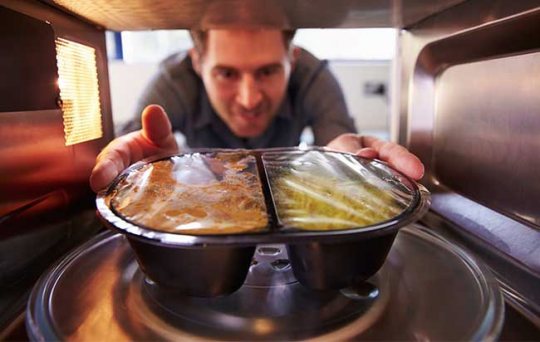Is It Safe to Cook Foods Packaged in Plastic?

Here’s the truth about frozen dinners, boil-in-the-bag rice, and steam-in-the-bag vegetables (Image by Thinkstock)
You’ve probably heard that heating food in plastic containers is dangerous.
But what about food that’s meant to be cooked in the package, like frozen dinners or boil-in-the-bag rice? That must be safe, right?
Related: The Best Food Choice When You Don’t Have Time to Cook
The answer is complicated.
The concern stems from the fact that chemicals in some plastics—namely, bisphenol A (BPA) and phthalates—leach from the containers into your food, says Laura Vandenberg, Ph.D., a professor of environmental health science at the University of Massachusetts—Amherst.
The chemicals are more likely to leach if the container has been heated, says Vandenberg.
The materials used to package frozen dinners or boil-in-the-bag rice probably don’t contain BPA—but it’s safe to assume that similar compounds are present in most plastic packaging you’ll come across, she says.
What’s still debated is whether BPA and those other chemicals are harmful.
The Endocrine Society, a professional organization for scientists and doctors who specialize in hormones, recently warned that the compounds interact with your hormones in ways that may cause cancer, diabetes, and obesity.
Related: Is There Anything That DOESN’T Give You Cancer?
But the Food and Drug Administration has repeatedly reviewed the research on BPA and insisted that it’s safe. Same goes for the European Food Safety Authority.
FDA scientists say that your body quickly breaks down BPA and excretes it in your urine and feces, no harm done.
Why the controversy? It’s impossible to prove whether these chemicals are harmful or not because you’d have to risk poisoning people to find out, says Men’s Health Nutrition Advisor Alan Aragon, M.S.
So scientists have to rely on studies done on animals, mathematical models, and research that shows correlation but can’t prove cause and effect. And those methods aren’t definitive.
If you want to err on the side of caution, it’s easy to reduce your exposure.
Just dump the contents of your frozen meal or other packaged food into a glass container. Put the lid on slightly askew and microwave it that way, says Vandenberg. Use a food thermometer to ensure the meal has reached a safe cooking temperature.
If you’re steaming vegetables, you may want to add a splash of water to make sure they cook properly. As for rice, there’s plenty of quick-cooking rice at your supermarket that doesn’t need to be boiled in the bag.
By Ali Eaves
More from Men’s Health:
